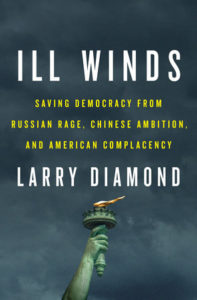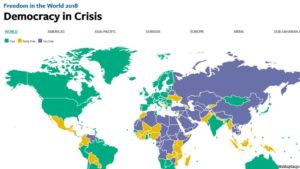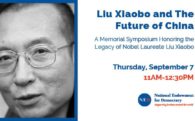 Larry Diamond has spent 40 years circumnavigating the globe promoting democracy in Nigeria, Venezuela and some 70 other countries. Yet today he is aghast, notes Gary J. Bass, a professor of politics and international affairs at Princeton, and the author, most recently, of “The Blood Telegram.”
Larry Diamond has spent 40 years circumnavigating the globe promoting democracy in Nigeria, Venezuela and some 70 other countries. Yet today he is aghast, notes Gary J. Bass, a professor of politics and international affairs at Princeton, and the author, most recently, of “The Blood Telegram.”
“After three decades in which democracy was spreading and another in which it was stagnating and slowly eroding, we are now witnessing a global retreat from freedom,” Diamond observes in his impassioned book “Ill Winds: Saving Democracy From Russian Rage, Chinese Ambition, and American Complacency,” in which he proves a stalwart, persuasive champion for democracy at a moment when its reputation has been fouled, Bass writes for the New York Times:
The villains of this book are Xi [Jinping] and Vladimir V. Putin, who “have enough power and ambition to undermine the entire global liberal order.” Repeatedly quoting from the Cold War strategist George F. Kennan, Diamond advocates a military buildup to thwart Russian or Chinese aggression. Unless American and European democracies get their acts together, he warns darkly, the European Union and NATO might collapse, a “Greater Russian Empire” could rise as the heir to the Soviet Union and China would threaten the freedom of democracies across Asia — all resulting in “depths of oppression and aggression that we have not seen since the end of World War II.”
 Earlier this year, the watchdog organization Freedom House reported the 13th straight year of decline for democracy across the globe. You’ve been teaching the subject for 30 years. How bad are things? TIME’s Karl Vick asks Diamond:
Earlier this year, the watchdog organization Freedom House reported the 13th straight year of decline for democracy across the globe. You’ve been teaching the subject for 30 years. How bad are things? TIME’s Karl Vick asks Diamond:
It’s an emerging crisis. It’s not the 1930s. We don’t have the situation where a blatantly fascist party has conquered a democracy. It’s a more subtle, creeping and incremental process. But there’s this sense, as there was in the 1920s and 1930s, that it’s the authoritarian regimes or the current neofascist movements that have the energy, the dynamism, the popular engagement.
 As the White House’s rhetorical and symbolic emphasis on freedom and democracy has waxed and waned over the past four decades, nonprofits and government agencies, such as the National Endowment for Democracy, the U.S. Agency for International Development, and the State Department’s Bureau of Democracy, Human Rights, and Labor, have taken over the detailed work of democracy assistance, Diamond writes for Foreign Affairs:
As the White House’s rhetorical and symbolic emphasis on freedom and democracy has waxed and waned over the past four decades, nonprofits and government agencies, such as the National Endowment for Democracy, the U.S. Agency for International Development, and the State Department’s Bureau of Democracy, Human Rights, and Labor, have taken over the detailed work of democracy assistance, Diamond writes for Foreign Affairs:
The United States has devoted around $2 billion per year over the last decade to programs promoting democracy abroad—a lot of money, but less than one-tenth of one percent of the total federal budget. Although the U.S. government should spend more on these efforts, the fundamental problem is not a question of resources. Instead, it is the disconnect between the United States’ admirable efforts to assist democracy, on the one hand, and its diplomatic statements, state visits, and aid flows that often send the opposite message, on the other.
 If the universal principles of liberal democracy are going to be revived, that will require not just American renewal, but the leadership of a multitude of free republics spanning India, Japan, Germany, South Korea, France, Britain and South Africa, Bass adds:
If the universal principles of liberal democracy are going to be revived, that will require not just American renewal, but the leadership of a multitude of free republics spanning India, Japan, Germany, South Korea, France, Britain and South Africa, Bass adds:
Whether in Taiwan, Mongolia or Ghana, people like their rulers to be lawful, accountable and disposable. Dictatorships will always have to fear their people as they get richer and better educated; tyrannical regimes can always splinter; and courageous opposition leaders will always rise up…. Before dying of cancer in Chinese state captivity, Liu Xiaobo, the Nobel laureate and democracy activist, wrote that “although people must still deal with tyranny and the suffering that it causes, they can respond to hate with love, to prejudice with tolerance, to arrogance with humility, to degradation with dignity and to violence with reason.”







